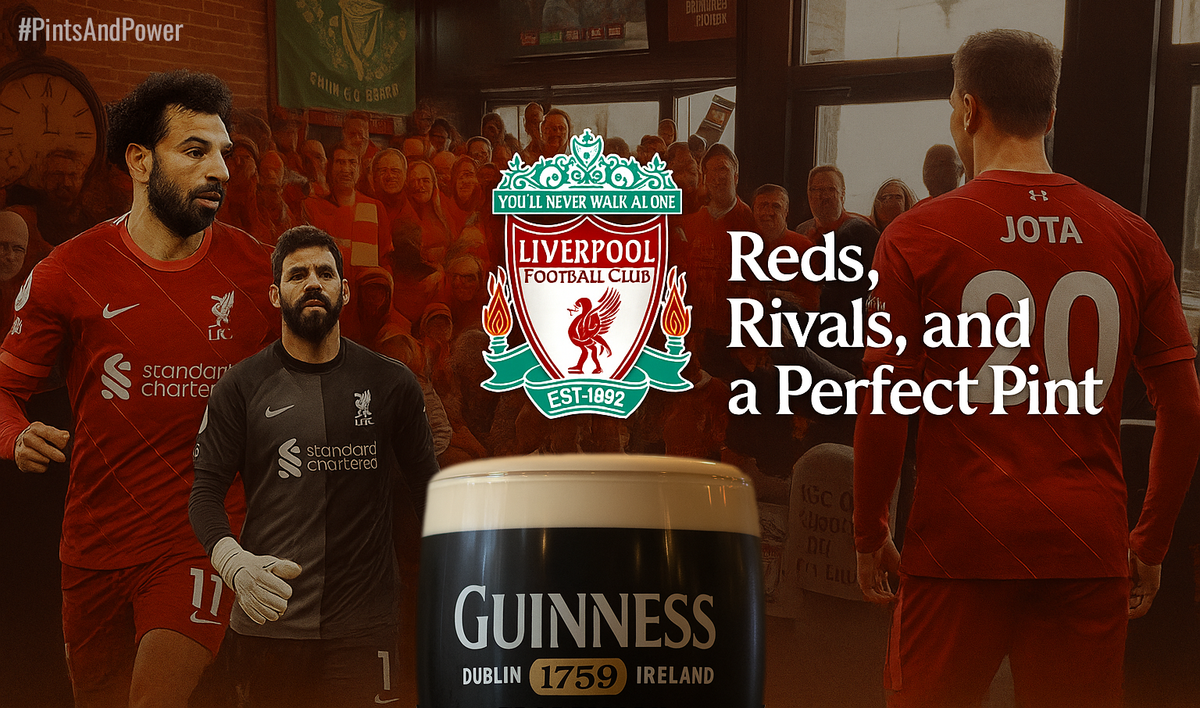Reds, Rivals, and a Perfect Pint
There’s an old joke: “What are the two major religions in Ireland today?” The answer? “Manchester United and Liverpool.”

Step into any Irish pub on match day and you’ll see it: two colors, one pint. Manchester United red-and-white, Liverpool red-and-gold — and in nearly every hand, a Guinness. The match stirs the rivalry, the pint keeps the peace, and together they’ve been part of Irish weekends for generations.
Before the Premier League even existed, Irish fans were already devoted to English clubs. Emigration to Liverpool and Manchester knitted deep family ties. Radio broadcasts crackled into Irish homes when local coverage was scarce. And legends like Liam Brady and Robbie Keane transcended club crests and became national heroes.
Only two clubs towered above the rest: Manchester United and Liverpool. Allegiances divided families. Friendships were tested over pints. Jerseys on matchday said as much about your roots as about football.
Guinness, of course, pours through both camps — part of the ritual in both red-and-white and red-and-gold pubs. It’s been there for the scorelines and for the deeper moments — because sport is as much about identity as it is about the scoreboard.
Confession: I’m a New Fan… Sort of
Here’s the admission: I wasn’t born into football — American football was my world, the Patriots my team. Soccer was always “soccer.” But now? I get it.
I’ve lived the highs and lows of fandom. The 70s and 80s losses, the “Squish the Fish” Super Bowl underdogs, the Bears’ beatdowns, rebuilds, the Tom Brady dynasty, and now the reset. I understand passion.
But the community around Liverpool FC — and especially the Irishness woven into that support — is something else. It’s not just about a team; it’s about who you are when you stand among your own.
The Moments, the Stars, and a Heartbreaking Farewell
Now I’m hooked. I feel the rush when Mohamed Salah splits defenses. The electricity when Luis Díaz barrels forward. The shared gasp when the net ripples.
And then there’s heartbreak. In July, the community was rocked by a tragedy — Diogo Jota, just 28 years old, died in a car crash alongside his brother, André Silva. It was gut-wrenching.
Liverpool responded not with stats or titles but with something far deeper: they retired his No. 20 jersey across all levels of the club, in consultation with his wife and family — a rare and profound tribute (News24). In the Premier League, numbers usually go away for legends. Here, Jota’s was retired for the heartbreak, not the record — Europeans understand that kind of love (Wikipedia, AS.com).
Back to Boland's: Community Lives Here
At Boland's, the Official Liverpool Supporters Club (OLSC) chapter feels like home. Kickoff at 7 am? The doors are open. At 3 pm? Wall-to-wall scarves and song. What began with a few turned into well over a hundred — at the 2025 trophy lift, more than 140 sat shoulder to shoulder, ages 8 months to 80 years, united in one heartbeat.
This Friday, the Premier League returns. At Boland's, Guinness will flow. Scarves will rise. You’ll Never Walk Alone will thunder before the whistle. Because here, the match is more than ninety minutes. It’s legacy. Rivalry. Community. All carried in a pint.



Comments ()